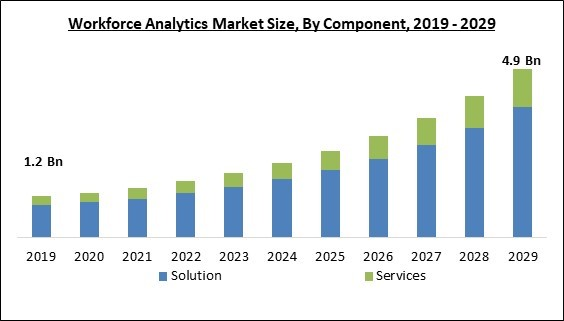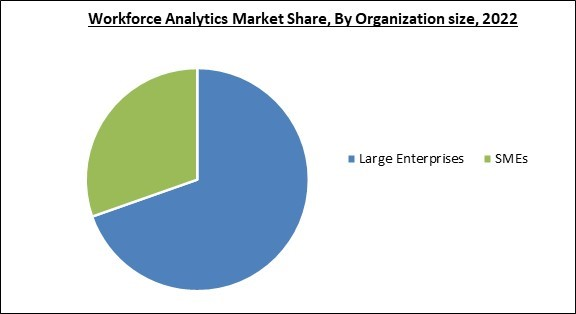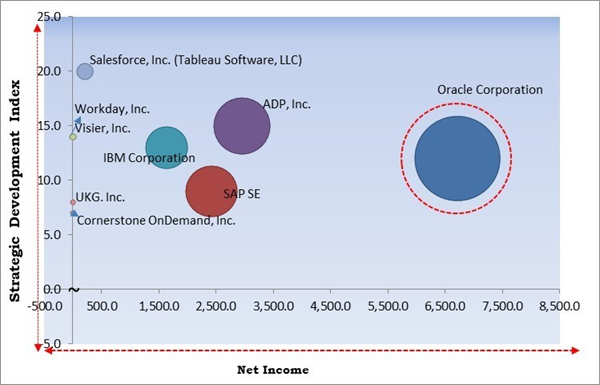A sophisticated set of data analysis techniques called "worker analytics" is used to evaluate and improve a wide range of workforce performance. It examines the personnel, hiring, training and development, employee relations, pay, and benefits. Also, it makes it easier to analyze common ratios like time, cost per hire, retention rate, start-up time, add rate, replacement rate, accession rate, and offer acceptance rate.
The broad term "workforce analytics" refers directly to an institution's staff. It covers all individuals operating in different capacities inside a company, including those based remotely, freelancers, on-site workers, consultants, and others. The need to address long-term labor challenges, the rise in the requirement to identify talent shortages from performance data, the need to gain a competitive edge, and the importance of ensuring employee satisfaction and engagement are the key market trends in the workforce analytics space.
The usage of machine learning and blockchain technologies, and workforce analytics is anticipated to offer lucrative potential for market expansion. AI-based workforce analytics solutions, the accessibility of enormous volumes of HR data, and the rise of data sources. Trends including increased data utilization for strategic workforce planning, gaining a competitive edge, addressing long-term labor challenges, and ensuring employees are engaged and satisfied are the main reasons propelling the market's growth.
Monitoring this information enables analysts to assess the success of managers' efforts to involve their staff in planning improvements, resolving questions, establishing expectations, and disclosing performance concerns. In addition, evaluation of an employee's performance helps managers identify the areas that need development and those that meet or surpass expectations.
COVID-19 Impact Analysis
The COVID-19 worldwide public emergency has significantly affected almost all industries, and the workforce analytics market was no exception. The demand for computer networks, applications, storage, and resources available over the internet has significantly expanded during COVID-19. People work from home during the COVID-19 shutdown in many different nations, significantly raising the demand for internet apps. The need for cloud-based solutions is skyrocketing right now. The market for workforce analytics will be supported by growing demand for cloud-based solutions.Market Growth Factors
Incorporation of technologies like ML, NLP and AI
Workforce analytics software can comprehend spoken and written human language by employing natural language processing, a subset of artificial intelligence. A recruitment chatbot, for instance, will make it easier to communicate with candidates right away, starting with requesting their CV and contact information and continuing with screening questions about their skills, knowledge, and experience. Also, it will arrange a human recruiter interview. Therefore, incorporating AI & NLP with workforce analytics solutions enables automated resume matching and accelerates the screening process by selecting the individuals with the best qualifications and education. Thus, during the forecast period, the use of AI and ML in workforce analytics is anticipated to fuel market expansion.More preference to data driven decision making
The complexity of workforce management is increasing, which opens the door for quantitative ways to handle complexity. Big data technologies, for instance, are being adopted by businesses to stimulate growth. As a result, businesses see big data technology as having major potential for improving staff retention. Analytics can shed light on employee behavior and help spot those most likely to depart the company soon. Additionally, it provides a summary of employee behavior through data analysis, allowing businesses to make informed decisions about their personnel. Therefore, big data analytics and other cutting-edge tools will be used more frequently, promoting the market's expansion.Market Restraining Factors
Dearth of skilled professionals impeding the market growth
Businesses need personnel that is knowledgeable about big data and contemporary technologies in order to manage enormous amounts of data, which supports business growth. However, in order to execute their plans, businesses that are developing and making investments in data analytics are having difficulty finding qualified employees. This makes it more difficult for service providers to meet the expanding needs of their clientele, which will impede the growth of the workforce analytics market.Component Outlook
Based on component, the workforce analytics market is segmented into solutions, and services. In 2022, the solutions segment held the highest revenue share in the workforce analytics market. Enterprises can use workforce analytics to evaluate workforce data from different HR systems and derive conclusions from the analysis. As a result, enterprises can discover the ideal methods for employee engagement, retention, and recruitment by utilizing workforce analytics. Additionally, it aids HR departments in developing better decisions based on data. Also, it enhances the overall experience of employees and increases their level of engagement.Organization Outlook
By organization, the workforce analytics market is fragmented into large enterprise and small enterprise. The large enterprise segment dominated the workforce analytics market with the maximum revenue share in 2022. This is because workforce analytics makes it possible to evaluate such a large amount of data for less money. Additionally, these technologies allow companies to control sizable employee databases and offer real-time access to employee information anywhere in the world.Vertical Outlook
Based on vertical, the workforce analytics market is categorized into IT & telecom, BFSI, manufacturing, retail & e-commerce, government, healthcare & life sciences, education, energy & utilities, and others. The BFSI segment garnered a significant revenue share in the workforce analytics market in 2022. The industry is experiencing significant disruption due to competitive pressures & regulatory reforms. It has particular difficulties, such as threats to information security, legal requirements, and limited business margins. The difficulties drive the BFSI sector to employ workforce analytics for employee associations to restructure operations and cut labor expenditures.Deployment Mode Outlook
By deployment mode, the workforce analytics market is bifurcated into cloud and on-premise. The cloud segment acquired a substantial revenue share in the workforce analytics market in 2022. The reason is that cloud-driven deployment offers flexibility, efficacy, and cost-efficiency. Furthermore, it offers users a better platform that can be accessed from various locations. Due to its advantages, users prefer cloud-based software over on-premise software because of its expensive installation and upgrade expenses.Regional Outlook
Region wise, the workforce analytics market is analyzed across North America, Europe, Asia Pacific and LAMEA. In 2022, the North America region led the workforce analytics market by generating the largest revenue share. The region has advanced technology and is faster to embrace novel innovations. The dominance of North America in the market is also attributable to a number of regional businesses that offer analytics solutions.The Cardinal Matrix - Workforce Analytics Market Competition Analysis
The major strategies followed by the market participants are Product Launches. Based on the Analysis presented in the Cardinal matrix; Oracle Corporation is the forerunner in the Workforce Analytics Market. Companies such as ADP, Inc., IBM Corporation, and SAP SE are some of the key innovators in Workforce Analytics Market.
The market research report covers the analysis of key stake holders of the market. Key companies profiled in the report include IBM Corporation, SAP SE, Salesforce, Inc. (Tableau Software, LLC), Oracle Corporation, ADP, Inc., Workday, Inc., Cornerstone OnDemand, Inc. (Clearlake Capital Group, L.P.), Visier, Inc., UKG, Inc. and WorkForce Software, LLC.
Recent Strategies Deployed in Workforce Analytics Market
Partnerships, Collaborations and Agreements:
- Sep-2022: Salesforce expanded its partnership with Snowflake Inc., a cloud computing-derived data cloud enterprise. With this expansion, Connecting with Snowflake, Salesforce customers would be able to sync data in real-time between the Salesforce Customer Data Platform (CDP) and Snowflake, helpful in the reduction of risks and costs that are usually involved with traditional sync methods. Moreover, the acquisition would provide Salesforce customers with the power to extract insights into data from Snowflake.
- Jun-2022: Visier came into partnership with symplr, a healthcare operations solutions provider, to develop a talent analytics feature offering, for the supply of enhanced product experience. With this partnership, Visier's expertise in delivering healthcare operations solutions would be combined with symplr's people analytics capabilities empowering Visier's customers to make high-level data-driven staffing decisions through deep data analytics.
- May-2022: IBM expanded its partnership with Ernst & Young Global Limited, consulting, assurance, tax, and transaction services provider, to simplify Workforce challenges. With this expansion, EY's Organization and Workforce, Mobility, and HR Transformation business would be merged with IBM Talent Transformation business and hybrid cloud and AI capabilities providing aid to enterprises globally in the digital transformation and getting enhanced secured solutions enabling them to overcome the workforce challenges. Moreover, the clients would be able to better transform their HR functions by making improvements in their workforce management.
- Jan-2022: SAP SE expanded its partnership with Icertis, a software company providing contract management software to businesses, facilitating enterprises in getting augmented efficiency, and mitigating risk. Through this partnership, the combined efforts of SAP and Icertis with their leading technological expertise in providing business management software and contract management software-related services respectively would be helpful in the development of SAP's suite across ERP, finance, procurement, sales, and HR, enabling SAP's customers to get increased efficiency, and reducing risk in their businesses.
Product Launches and Expansions:
- Mar-2023: SAP announced the launch of SAP Datasphere solution, a next-generation SAP Data Warehouse Cloud service data management suite, providing customers the ability to easily access the right business data. SAP Datasphere would facilitate businesses in removing hidden data tax, allowing customers to develop business data architecture offering informational data with business context. Additionally, Datasphere data cataloging capabilities would be helpful in automatically detecting, operating, and governing data.
- Nov-2022: IBM announced the launch of Business Analytics Enterprise, a portfolio of business intelligence planning, budgeting, reporting, forecasting, and dashboard solutions, to offer users a powerful view of data sources across their business. IBM Business Analytics Enterprise would also incorporate the latest IBM Analytics Content Hub facilitating users in managing and accessing analytics and planning tools from several vendors in a single, and personalized dashboard.
- Nov-2022: Salesforce released Bundle, an Analytics Performance solution, to provide aid to businesses in analytics tools consolidation. With Bundle, enterprises would be able to unlock the potential of data management, allowing them to manage and secure targeted critical analytics through Advanced Management beneficial in delivering customers the training resources with eLearning.
- Oct-2022: ADP announced the launch of the Voice of the Employee Survey Solution for the enhancement of Employee Workplace Experience. Built on advanced technologies, the new solution would offer data-driven employee surveys helpful in the prediction of employee behavior, easing out results interpretation and facilitating employers in gathering employee feedback and sentiment better.
- Oct-2022: Cornerstone unveiled the Talent Experience Platform, a unified portfolio of learning and talent offerings with advanced people experiences, AI technology, and an open architecture for enhanced workforce experiences for businesses. Talent Experience Platform developed for providing aid to HR and business owners to fully utilize the workforce potential. With this offering, the talent leaders now would be able to optimize decision-making and bring agility to their businesses.
- Oct-2022: Oracle released a line of innovative products to its suite of data and analytics offerings, namely, Oracle Fusion Analytics across CX, ERP, HCM, and SCM analytics, facilitating customers to make decisions faster and better. The added capabilities such as powerful Oracle Fusion CX Analytics, Oracle Fusion ERP Analytics, Oracle Fusion SCM Analytics, and Oracle Fusion HCM Analytics. Oracle Analytics Cloud innovates across the complete data and analytics workflow, and third Oracle data and analytics services would simplify the data interpretation, and AI/ML advancements extending the ML capabilities in Analytics Cloud with other Oracle Cloud Infrastructure (OCI) cognitive offerings allowing improved visual information processing enabling customers to better analyze and get business insights when dealing with a huge amount of data, bringing efficiencies and productivity in the customers' businesses.
- Sep-2022: Visier announced the launch of Hybrid Work under the Visier NOW Solution portfolio helpful in analyzing the impacts of hybrid work. The solution would enable businesses in tracking, analyzing, and reporting the critical elements of the business challenges such as while working with a hybrid work model to maintain productivity, and easily manage employees and workspaces.
- Apr-2022: Oracle introduced Oracle ME; an all-inclusive Employee Experience Platform developed for fulfilling the evolving workforce requirements. The platform within Oracle Cloud HCM would provide HR and business owners tools to boost workforce success rates with new offerings for communication, productivity, and engagement enhancements.
- Mar-2022: Visier unveiled six new offerings to Visier NOW solutions, a suite of purpose-driven offerings developed to tackle the evolving urgent workforce challenges, to streamline workforce management. The line of Visier Now solutions would now incorporate Hire Smarter, Strategic Compensation, Happiness Factors, Better Managers, Talent Pathways, Revenue Team Management & Optimization, Retention Focus, and Guided Diversity Planning. With an all-inclusive portfolio, businesses would now better be able to manage their workforce.
- Mar-2022: Visier introduced People Cloud, an innovative tool developed to provide enhanced insight-powered performance. With People Cloud advanced technological solution, businesses would be able to automate informational people insights beneficial in balancing budgets and the number of employees while empowering the organizations to make better-targeted business decisions.
Acquisitions and Mergers:
- Jan-2023: ADP completed the acquisition of Securax Tech Solutions Private Limited, manufacturers, distributors, and importers of Security Systems, to boost ADP’s capability in delivering integrated payroll and time solutions. Through this acquisition, Securax's capabilities in providing advanced cloud-driven time, attendance, and workforce management software and biometric devices would strengthen ADP to offer solutions in the APAC region supporting ADP to deliver clients and their employees a better experience in the tracking of leave and time alongside management of shifts and overtime.
- Jul-2022: IBM took over Databand.ai, a data observability enterprise, to boost IBM's hybrid cloud and AI offerings. Through this acquisition, the combined power of Databand’s data observability platform and IBM Observability by Instana APM and IBM Watson Studio would empower IBM to deliver improved observability tools all over IT operations.
- Jul-2022: SAP SE acquired Askdata, a search-driven analytics solutions provider, enabling enterprises to make improved informed decisions utilizing the power of AI-driven natural language searches. With this acquisition, Askdata’s IP power would be leveraged by the SAP Business Technology Platform providing a next-generation lightweight analytics experience to SAP Analytics Cloud solution customers beneficial in making better decisions.
- May-2022: Cornerstone OnDemand took over EdCast, a unified SaaS platform powering end-to-end employee experience journeys, for the integration of talent and HR systems. With this acquisition, EdCast's expertise in providing businesses AI-powered knowledge and learning content management services would be leveraged by Cornerstone in delivering an open growth marketplace enabling enterprises to combine their current talent and HR systems through intelligent data and AI tech architecture.
- May-2022: Salesforce completed the acquisition of Troops, a bot-centered software service provider, for the creation of useful Slack bots. With this acquisition, Troops would become part of Slack, a Salesforce company. Moreover, with this acquisition, Salesforce would leverage the power of Troops in designing tools that offer real-time insights from systems of record to systems of engagement, to integrate tools and workflows on a single platform.
- Jan-2022: Workday took over VNDLY, a managed services provider Workforce Management Platform, allowing businesses to better management of their changing workforce dynamics. Through this acquisition, VNDLY's advanced solutions for the vendor management industry would be combined with Workday's Financial Management and Workday Human Capital Management offerings to support Workday's customers with the capability to easily manage both permanent and external/consulting workforce.
Scope of the Study
By Component
- Solution
- Services
By Vertical
- IT & Telecom
- BFSI
- Manufacturing
- Retail & Ecommerce
- Government
- Healthcare & Life Sciences
- Education
- Energy & Utilities
- Others
By Organization size
- Large Enterprises
- SMEs
By Deployment Mode
- On-premise
- Cloud
By Geography
- North America
- US
- Canada
- Mexico
- Rest of North America
- Europe
- Germany
- UK
- France
- Russia
- Spain
- Italy
- Rest of Europe
- Asia Pacific
- China
- Japan
- India
- South Korea
- Singapore
- Malaysia
- Rest of Asia Pacific
- LAMEA
- Brazil
- Argentina
- UAE
- Saudi Arabia
- South Africa
- Nigeria
- Rest of LAMEA
Key Market Players
List of Companies Profiled in the Report:
- IBM Corporation
- SAP SE
- Salesforce, Inc. (Tableau Software, LLC)
- Oracle Corporation
- ADP, Inc.
- Workday, Inc.
- Cornerstone OnDemand, Inc. (Clearlake Capital Group, L.P.)
- Visier, Inc.
- UKG, Inc.
- WorkForce Software, LLC
Unique Offerings
- Exhaustive coverage
- The highest number of Market tables and figures
- Subscription-based model available
- Guaranteed best price
- Assured post sales research support with 10% customization free
Table of Contents
Companies Mentioned
- IBM Corporation
- SAP SE
- Salesforce, Inc. (Tableau Software, LLC)
- Oracle Corporation
- ADP, Inc.
- Workday, Inc.
- Cornerstone OnDemand, Inc. (Clearlake Capital Group, L.P.)
- Visier, Inc.
- UKG, Inc.
- WorkForce Software, LLC











